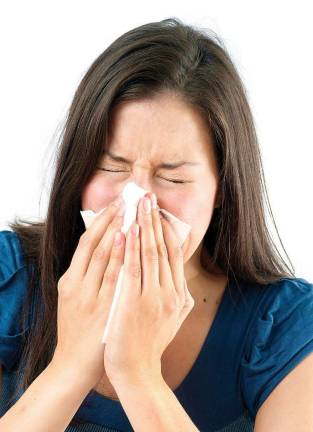Sneezing Early and Often This Season

Spring, when a hay fever sufferer turns to thoughts of tissues The early arrival of spring in New York meant a March filled with returning birds and budding flowers. But the season also means the miserable return of hay fever. Hay fever, or allergic rhinitis, is the allergic reaction to indoor and outdoor allergens such as pollen and dust. Usually brought on by a genetic predisposition early in life, seasonal allergies affect a little under half of the American population, or 150 million people, said allergist Dr. Morris Nejat. This year, because of the dry, mild winter, hay fever symptoms began early and strong for allergy sufferers. Even in an urban environment like New York, pollen counts are high because pollen can travel airborne for almost 100 miles, said Dr. Marjorie Slankard, director of the allergy clinic at New York Presbyterian/Columbia Medical Center. Pollen counts in the city have been registering at medium/high levels, or around a 10 out of 12 on the pollen scale, according to Pollen.com. Slankard said that some of her patients even feel better in the suburbs or more rural areas than in the city. "In New York City, people are miserable," said Nejat. "With the early spring, you want to enjoy the outside, as opposed to stay inside and work." But if you suffer from allergies, enjoying the spring weather is probably the last thing you can do. Slankard said hay fever sufferers should cut down their exposure by keeping their windows closed and turning on air conditioners to cleanse the air of pollen. She also suggested that allergy sufferers shower and wash their hair when they come inside to avoid increasing the pollen in their homes. Many people experience only minor hay fever symptoms, such as sneezing, lethargy and itchy, watery eyes, but for more uncomfortable cases of wheezing and difficulty breathing, there are many options. Nejat said treatment should be based on the range and severity of symptoms. For allergies affecting the nasal passageways, use a nasal spray; for itchy eyes, eye drops may be the answer. "If you're in the more moderate to severe case, you really want to cut down your exposure to allergens," said Nejat. For an over-the-counter symptom alleviator, allergy specialists suggest Claritin or Allegra. But in moderate or severe cases of hay fever, prescription antihistamines like Clarinex are a better option than over-the-counter medication, said Nejat. If allergy symptoms persist, an allergy shot, which alleviates symptoms in three in four people, may be the answer, said Slankard. She also said that children with allergies should take allergy shots to reduce the risk of asthma later on in life. Because of the range of symptoms and their severity, doctors suggest visiting an allergy specialist to get the medication you need to end the suffering. Hay fever is affected by the pollen count, which can increase with dry, windy days and warm weather. This year, Slankard said her patients began seeing symptoms in February, which is unseasonably early. This is bad news for hay fever sufferers, because early high pollen counts may mean worse symptoms. Dr. Beth Corn of Mt. Sinai Hospital said that early pollen counts prime the immune system, so it takes less pollen to feel uncomfortable. And the sneezing and wheezing will most likely not abate. "It's still early April, so it will get much worse in the next few weeks," said Nejat. "I expect pollen counts to get much higher."